Untitled Document
Next Stop: Big Brother
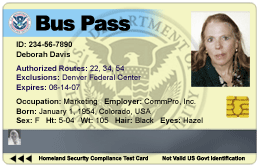 |
Will it come to this? The
ID card above is satire, but how soon before it becomes reality? When
honest, law-abiding citizens can't commute to work on a city bus without
a demand for their "papers," something is very, very wrong. |
Meet Deborah Davis. She's a 50 year-old mother of four who
lives and works in Denver, Colorado. Her kids are all grown-up: her middle son
is a soldier fighting in Iraq. She leads an ordinary, middle class life. You
probably never would have heard of Deb Davis if it weren't for her belief in
the U.S. Constitution.
One morning in late September 2005, Deb was riding the public bus to work. She
was minding her own business, reading a book and planning for work, when a security
guard got on this public bus and demanded that every passenger show their ID.
Deb, having done nothing wrong, declined. The guard called in federal cops,
and she was arrested and charged with federal criminal misdemeanors after refusing
to show ID on demand.
On the 9th of December 2005, Deborah Davis will be arraigned in U.S. District
Court in a case that will determine whether Deb and the rest of us live in a
free society, or in a country where we must show "papers" whenever
a cop demands them.
Get the facts...
Commuting By Bus In Denver? Papers, Please.
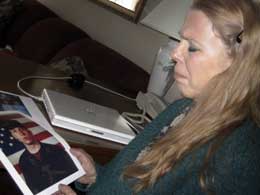 |
Deborah Davis defends freedom at home while her son serves abroad in Iraq. |
DEB DAVIS LIKES to commute to work by public bus. She uses the time to read,
crochet or pay bills. It's her quiet time. What with the high price of gas,
she saves money, too: a week's worth of gas money gets her a month's worth of
bus rides
The bus she rides crosses the property of the Denver Federal Center, a collection
of government offices such as the Veterans Administration, the U.S. Geological
Survey, and part of the National Archives. The Denver Federal Center is not
a high security area: it's not Area 51 or NORAD.
On her first day commuting to work by bus, the bus stopped at the gates of
the Denver Federal Center. A security guard got on and demanded that all of
the passengers on this public bus produce ID. She was surprised by the demand
of the man in uniform, but she complied: it would have meant a walk of several
miles if she hadn't. Her ID was not taken and compared to any "no-ride"
list. The guard barely glanced at it.
When she got home, what had happened on the bus began to bother her. 'This
is not a police state or communist Russia', she thought. From her 8th grade
Civics class she knew there is no law requiring her, as an American citizen,
to carry ID or any papers, much less show them to anyone on a public bus.
She decided she would no longer show her ID on the bus.
For the next two weeks she said had no ID. The guards would then ask her if
she was getting off on Denver Federal Center property. When she told them 'no',
they would let her alone: not once was she ever asked to get off the bus.
The Compliance Test
On Monday, September 26th 2005, Deb Davis headed off to work on the route 100
bus. When the bus got to the gates of the Denver Federal Center, a guard got
on and asked her if she had an ID. She answered in the affirmative. He asked
if he could see it. She said no.
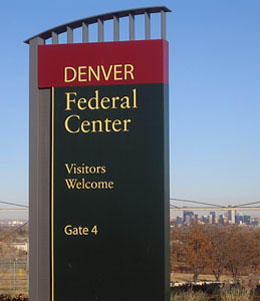 |
Visitors Welcome (to be arrested). The entrance to the Denver Federal Center. |
When the guard asked why she wouldn't show her ID, Deb told him that she didn't
have to do so. The guard then ordered her off the bus. Deb refused, stating she
was riding a public bus and just trying to get to work.
The guard then went to call his supervisor, and returned shortly with a federal
policeman. The federal cop then demanded her ID. Deb politely explained once
again that she would not show her ID, and she was simply commuting to work.
He left, returning shortly thereafter with a second policeman in tow.
The Second Compliance Test
This second cop asked the same question and got the same answer: no showing
of ID, no getting off the bus.
The cop was also annoyed with the fact that she was on the phone with a friend
and didn't feel like hanging up, even when he 'ordered' her to do so.
The second cop said everyone had to show ID any time they were asked by the
police, adding that if she were in a Wal-Mart and was asked by the police for
ID, that she would have to show it there, too.
She explained that she didn't have to show him or any other policeman my ID
on a public bus or in a Wal-Mart. She told him she was simply trying to go to
work.
The Arrest
Suddenly, the second policeman shouted "Grab her!" and he grabbed
the cell phone from her and threw it to the back of the bus. With each of the
policemen wrenching one of her arms behind her back, she was jerked out of her
seat, the contents of her purse and book bag flying everywhere. The cops shoved
her out of the bus, handcuffed her, threw her into the back seat of a police
cruiser, and drove her to a police station inside the confines of the Denver
Federal Center.
Once inside, she was taken down a hall and told to sit in a chair, still handcuffed,
while one of the policemen went through her purse, now retrieved from the bus.
The two policemen sat in front of their computers, typing and conferring, trying
to figure out what they should charge her with. Eventually, they wrote up several
tickets, took her outside and removed the handcuffs, returned her belongings,
and pointed her toward the bus stop. She was told that if she ever entered the
Denver Federal Center again, she would go to jail.
She hasn't commuted by public bus since that day.
What are the issues involved?
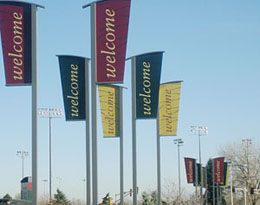 |
By 'Welcome', they mean 'Show us your papers'. Yet more signs at a Denver Federal Center entrance. |
The Legal Case
Deborah Davis' case is about one thing: the right to travel.
The reason why she was charged has absolutely nothing to do with security.
The guard at the Denver Federal Center wasn't checking IDs against a 'no ride'
list: there is no such thing. The demands made against Deb Davis were nothing
more than a compliance test, a demand that she kowtow to officialdom. And lest
we forget, having to show your ID is a search without a warrant.
The significance of Deb's case was readily apparent to the American
Civil Liberties Union of Colorado, who immediately arranged free legal representation.
The first-rate legal team of ACLU volunteers Norman Mueller and Gail Johnson
— attorneys from the prominent Colorado criminal defense firm of Haddon,
Morgan, Mueller, Jordan, Mackey & Foreman, P.C. — are mounting
a vigorous defense on Deborah Davis' behalf.
Deborah Davis responded to this compliance test in a way that would have made
the Founding Fathers proud. She is being prosecuted for no reason other than
being 'uppity' in the face of authority.
When Deb is arraigned in U.S. District Court on the 9th of December, she will
most likely be charged with the following federal criminal misdemeanors: 41
CFR § 102-74.375 (Admission to Property) and 41 CFR § 102-74.385 (Conformity
to Official Signs and Directions).
Through these charges, it appears that the Feds are claiming that people were
on notice that they had to show ID. Nowhere is this evident, unless 'Public
Welcome' flags are bureaucratese for 'Papers, please'. In addition, Deb wasn't
even visiting the Denver Federal Center. That the public bus transits the facility
isn't her fault. If the Center really is Denver's answer to Area 51, then public
buses should be driving around — not through — the Center.
What's Wrong With Showing ID?
"There are good people with bad papers; and bad people with good
papers."
- Bertold Brecht
What does an ID, any ID, do for security? The honest answer is 'not much'.
If anything, relying on ID for security purposes actually makes things worse.
Showing ID only affects honest people. If you're dishonest, you can obtain false
documents or steal the identity of an honest person.
If a 19 year-old college student can get a fake ID to drink, why couldn't a
bad person get one, too? And no matter how sophisticated the security embedded
into the ID, wouldn't a well-financed terrorist be able to falsify that, too?
The answer to both questions is obviously 'yes'.
Honest people, on the other hand, go to Pro-Life rallies. Honest people attend
gun shows. Honest people protest the President of the United States. Honest
people fly to political conventions.
Honest people also commute by public bus to work. What if those with the power
to put people on a 'no ride' list decided that they didn't like the reason for
which you wanted to travel? The honest people wouldn't be going anywhere.
Bad people, besides using fake IDs and stolen identities, can also make the system
of checking IDs work in their favor. The Carnival Booth effect, as described by
researchers at the Massachusetts Institute of Technology, means that terrorists
can probe an ID security system by sending a number of people on innocent trips
through the system and noting who is flagged for extra searches and who isn't.
They then send only those who the system doesn't flag on terrorist missions.
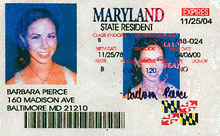 |
Still, some Americans think that 'if you have nothing to hide, you have nothing
to fear'. Were the Founding Fathers criminals trying to protect themselves when
they inserted the 4th and 5th amendments into the Bill of Rights? After all,
nobody who hasn't done anything wrong needs to worry about being searched or
being forced to testify against himself.
Over the years, Americans have become accustomed to showing ID in any number of
circumstances. Few have asked the question, 'Why?'.
The Department of Homeland Security has attempted to institute programs predicated
on the use of ID to improve security. The fact of the matter is that demands
for ID do nothing for security while making honest Americans less free.

